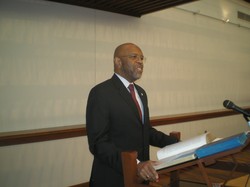The kitchen table was where the Rev. Ron Peters learned most about theology and inclusiveness, the president of the Interdenominational Theological Center in Atlanta told participants in the Presbyterian Church (U.S.A.)’s biennial synod Committee on Representation (COR) training event here.
“The kitchen table where I was raised ― that’s where I got my theology,” Peters said during his Oct. 14 sermon. “It was my parents’ house, but was all our table. Now we try to do the same thing for our children and grandchildren,” he said. “They all know where their places are and the conversation just flows ― the nurturing and shaping, where we share far more than food.”
That’s why the Christian church finds the table such an important image, Peters said. And for Presbyterians, it’s Committees on Representation that help assure everyone’s place at the denominational table ― a common table that expresses and reflects oneness in Jesus Christ.
“Unfortunately, we don’t hear much [common table] rhetoric in the public square these days,” Peters said. “We’ve grown captive to ethnic, theological and ideological tribalism.”
Preaching from the story in Matthew 26 ― where Jesus is gathered in the upper room with his disciples the night before he is crucified ― Peters said CORs have the responsibility to make sure there’s room for everyone at the table, “but as we gather at the table,” he said, “We MUST remember that we are not the host, it’s Christ.”
That realization “forces us to think outside our table to a bigger table,” Peters said, a table that includes not just varieties of Christians, but people of other faiths as well.
“How do we reconstruct a table with people we don’t understand, and may not even like?” Peters asked. “If we’ve learned anything from Jesus, it’s that through faith in God we shall overcome. With our hands on the table, God reconstructs all of life.”
A table reconstructed in God’s image, said keynote speaker the Rev. Carol Howard Merritt, makes room not just for different faces, but for different voices and opinions. “We hear that Presbyterians want their church to be innovative, diverse, intergenerational ― where people can point and say ‘people are welcome there,’” she said.
“Our churches aren’t there yet, but we have hope,” Merritt, pastor of Western Presbyterian Church in Washington, DC, continued. “People look back at the late 50s and early 60s as the ‘heyday’ of the Presbyterian church, with numbers and political power and they want to recreate it,” she said.
“That’s impossible ― thank God too many things have happened to return,” Merritt said. “Our hope is that we’ll have a bigger table than that, with all generations, all races, all ethnicities.”
Participants shared the changes they have experienced in the church and the world during their lifetimes ― from world wars and McCarthyism to the civil rights and anti-Vietnam War and women’s movements to space travel and technological innovation to globalization and post-modernism.
“This is an incredible place and time to be and there aren’t many other places where inclusive change can happen,” Merritt insisted, “so it’s important for COR to keep pushing us to deconstruct our table and reconstruct it in a different way.
“There is a great future ahead of us despite our worry and frustration with churches closing and leaving,” Merritt said, reflecting on the PC(USA)’s current turmoil. “The glory days may be over,” she said, “but especially for us who weren’t alive then, we’re looking ahead to the glory days!”

